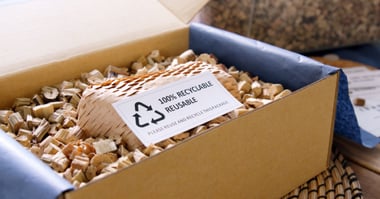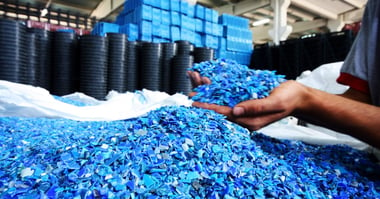At CleanHub, we absolutely love to see brands who talk the talk AND walk the walk. So we wanted to share a handful of those doing just that in the fashion world.
Why? Because Up to 100 billion clothing items are produced annually worldwide. Which is alarmingly disproportionate for 8 billion people.
But what is more scary is that every year across the world we produce 92 million tonnes of textile waste. [Business Waste 2025]
Those two numbers are way too close for our liking. And why? Because fast fashion was rocketed a throw away culture of buy quick, buy cheap, throw away, repeat.
With most of the clothes produced eventually finding their way to landfills, waterways and our oceans.
Charity shops won’t take them. Councils incinerate them. Retailers dump them on the global south. We’re running out of ideas on how to deal with our used clothes – and the rag mountain just keeps growing.
Fleur Britten, The Guardian, 2025 in ‘You sold it – now recycle it’: the protesters mailing worn-out clothes to the shops they bought them from',
Thankfully, we are all becoming increasingly aware of unsustainable fashion habits. As a result, some brilliant brands are leading the way in building a better industry, challenging throwaway culture and shifting to less harmful materials to protect our planet.
So, we decided to highlight some of them and shout out the brands making a positive impact and creating new buying behaviours.
Our Top Sustainable Clothing Brands
Click a link in the table to skip to our highlight on the brand, or settle in for a nice scroll and read about it brand on our list.
| Rank | Brand | Best for |
| 1 |
Utilizing natural materials |
|
| 2 |
Climate-neutral commitments |
|
| 3 |
Ocean awareness |
|
| 4 |
Pioneering sustainable clothing |
|
| 5 |
Forest conservation |
|
| 6 |
High-end sustainability |
|
| 7 |
Social activism |
|
| 8 |
Upcycling |
|
| 9 |
Responsible materials |
|
| 10 |
Ethical manufacturing |
|
| 11 |
Being plastic-free |
1. PANGAIA
Best for: Utilizing natural materials
Other features: B Corp certified, regenerative forest projects, 'ReWear' circular platform
PANGAIA considers itself a ‘materials science’ clothing company, focusing on developing sustainable fabrics and environmental initiatives.
The streetwear brand opts for simple, comfortable designs with a limited environmental impact. Some of the materials it’s developed include plant-based denim, made from hemp, and an alternative to feather down, made from flowers.
PANGAIA's most recent initiative is called ‘Bee The Change,’ and it is launching its Trillion Bees initiative at COP28 this year. Bees pollinate most of the world’s food sources; however, colonies are collapsing due to various ecological factors.
The movement's goal is to raise awareness of the changing behaviors of bees and work with businesses and scientists to understand better and find a solution. The Trillion Bees initiative is raising $1 billion to fund projects that can protect our bees.
2. Vuori
Best for: Climate-neutral commitments
Other features: Plastic credits, recycled materials, regenerative organic cotton
California-based brand Vuori might be small, but it’s certainly mighty. The athletic and leisure wear brand is 100% climate neutral, meaning the company has offset all its carbon emissions. What’s more, it’s also committed to plastic reduction and is one of the brands
As well as being climate-neutral, Vuori has also partnered with CleanHub to offset its plastic impact by 100%. The brand has switched to using recycled materials for its garment bags and is on track to reduce plastic use by 80% in its supply chain.
At the time of writing, Vuori have prevented 430,603 lbs of plastic waste from ending up in landfills, open environments, or our oceans.
Vuori also champions transparency, outlining its sustainability goals to reduce Scope 1 and 2 emissions by 42% by 2030. Scope 1 emissions refer to direct emissions created by the company, while scope 2 accounts for indirect emissions such as energy use.
It’s also supporting several environmental programs worldwide, like stopping deforestation in Borneo and backing emission-reduction initiatives in the US. These programs aim to offset carbon emissions, which they help fund through partnerships with Pachama and 3Degrees.
![]()
3. Finisterre
Best for: Ocean awareness
Other features: B Corp certified, materials made with recycled ocean plastics, Leave No Trace packaging
Inspired by British surfers, Finisterre, a Cornwall-based clothing and wetsuit brand, designs products for those who love the ocean.
The B Corp-certified company is committed to sourcing materials, such as biodegradable fibers and recycled textiles made from ocean plastic. They’re working toward a circular economy model where things can remain in circulation instead of going to waste.
An example of one of the fabrics they create from ocean plastic is called econyl, a recycled nylon. The brand works with a company called ECONYL, which turns fishing nets into reusable fabrics. Finisterre claims that each tonne of econyl created saves 5.7 tonnes of CO2.
Additionally, customers have access to a range of resources to care for and repair their products, further backing up Finisterre's sustainability commitment.
Because the most sustainable product is the one you already own.
As well as creating sustainable clothing, Finisterre has developed many ocean programs to help unlock ocean access for all. Forming part of the Finisterre Foundation, the brand funds swimming lessons for children with disabilities and modifies wetsuits to help people get better access to the water. This, in turn, can help raise awareness for our seas and support the next generation of ocean conservationists.
Looking for sustainable swimwear brands? Check out our recommendations on our page: The Best Sustainable Summer Brands.
4. Patagonia
Best for: Pioneering sustainable clothing
Other features: Animal welfare programs, materials made from fishing nets, Fair Trade Certified factories
No list of sustainable fashion brands would be complete without Patagonia.
Founded by Yvon Chouinard over half a century ago, the rock climber and billionaire was determined to give away Patagonia shares to initiatives fighting climate change.
As part of the 1% for the Planet initiative, the brand has donated an impressive $140 million to a variety of grassroots environmental groups around the world. Moreover, the brand spearheaded the use of sustainable and recycled materials in its designs, such as biobased polyester, recycled cotton, and hemp.
Among countless sustainable projects, the brand also helps consumers connect with environmental initiatives worldwide through its Patagonia Action Works platform. Shoppers can use the platform to find local organizations and charities that are committed to environmental projects and see local events like discussions about sustainability.
5. Passenger
Best for: Forest conservation
Other features: Recycled cotton and polyester, Fair Trade Certified factories, agroforestry training programs
Passenger is a clothing brand for adventurous folk who want to look and do good. The brand’s ethos is simple: "We put sustainability & adventure at the heart of every product.”
Although this UK clothing company from the New Forest proves its eco credentials in various ways, it’s best known for its forest initiatives, having committed to re-planting trees since its conception. For each purchase, they plant a tree. This helps the brand restore forests and support people who protect our world’s trees.
So far, they’ve planted more than half a million trees and secured protection for 28,724,186 sqm of rainforest. The brand is also part of multiple global forest initiatives, such as the Rainforest Trust, Trees For The Future, and One Tree Planted.
Joanne, who works in Marketing here at CleanHub is a big fan of the brand:
"There are so many things I love about Passenger. The quality of the product has to be up there but I also love that the packaging is zero waste. I can compost both the paper and plastic that my items arrive in.
I also follow them on LinkedIn and they have an awesome brand TOV, and company culture.
My favourite Passenger item is my Waves & Trees t-shirt...because, well I love the ocean and trees 😍".
Jo
CleanHub Demand Generation Manager
Image credit: Passenger.com - no this is not a photo of Jo in her T
6. Stella McCartney
Best for: High-end sustainability
Other features: Cutting-edge alternative materials, 'Clevercare' labeling system, vegetarian-friendly
Stella McCartney is one of the most well-known luxury brands committed to environmentally friendly fashion.
Like other fashion companies on this list, Stella McCartney's garments are made from planet-friendly materials, such as grape-based alternatives to leather manufactured from 80% recycled raw waste. According to the Stella McCartney website, the environmental impact of animal-free leather is 24 times lower than animal-based materials.
On top of that, since 2012, all of their handbags have been lined with material made from recycled plastic bottles.
Stella McCartney is also committed to reporting and tracking its ecological goals, helping shoppers feel more empowered in purchasing decisions. They do this with blockchain technology that tracks the lifecycle of materials, ensuring that Stella McCartney’s team can monitor and ensure sustainability among their supply chain partners.
7. Story MFG
Best for: Social activism
Other features: Built-to-last products, regenerative agriculture, vegan and cruelty-free clothing
Story MFG’s founders believe that fashion can be a form of social activism, and they are constantly developing their manifesto to support a more positive planet. The brand has committed to a ‘positive future’ in several ways.
When brands make their products, offcuts are often discarded, which adds to the waste footprint of the fashion industry. Story MFG instead integrates unused materials into their designs to reduce waste.
Story MFG also supports textile agriculture that regenerates the land, which is essential because traditional textile processes and agriculture tend to deplete natural resources and impact the nutrients in the soil.
Regenerative agriculture aims to combat this by practicing more environmentally friendly farming practices, like avoiding pesticides. Story MFG is also helping to regenerate the land further by dyeing its products with natural dye in a replanted forest, allowing waste produced to fertilize the environment.
The Brighton brand is realistic in its sustainability goals, admitting there’s still some way before the fashion world is fully sustainable. However, like other brands, they’re working hard to make this a reality.
8. Greater Goods
Best for: Upcycling
Other features: Reclaimed materials, brand collaboration
Greater Goods is a London-based brand, well-known for its upcycling collaborations.
Research shows that the equivalent of one rubbish truck full of clothes is dumped into a landfill every second. Many of these items are made from synthetic materials, so the fibers will hurt the surrounding environment and are going leave their mark for hundreds of years.
One way to combat unnecessary waste is to look at ways to reuse and repurpose old clothing, which is exactly what Greater Goods are all about.
Jaimus Tailor, founder of Greater Goods, cites that the label aims to turn ‘nothing into something,’ combining unique materials from old garments into new streetwear looks. And we LOVE it!
Having partnered with major brands such as Nike, Greater Goods garments and accessories often feature a patchwork of textiles taken from unused products.
Take a look and shop Greater Goods
9. Camper
Best for: Responsible materials
Other features: Repairing and refurbishing scheme, Better Energy program, recycled and certified organic cotton
The founders of the footwear brand Camper established the company in Spain in 1975. It has since become a household name when it comes to its shoes — but that’s not all.
Bearing the motto “a little better, never perfect," Camper’s team constantly seeks more sustainable materials and is exploring recycled leather and synthetic alternatives. By 2030, the brand wants 100% of its materials to be “responsible.”
Camper hopes to swap materials for more natural and durable alternatives for a lower environmental impact. The brand also tries to trace all its product materials, from “raw state to the manufacturing and distribution processes, and at the end of their lives.”
A vision and mission like this is what the industry needs, and we're so impressed with Camper's focus on sustainability.
10. Yes Friends
Best for: Ethical manufacturing
Other features: Solar-powered factories, organic and Fairtrade cotton, minimal garment waste
We know that sustainability is quite a broad term. It accounts for a positive environmental, social, and economic impact.
To ensure it hits all three angles of sustainability, Yes Friends supports garment workers by creating ethically sourced, affordable clothing.
Less than 2% of people who create our clothes receive a fair living wage, meaning a large majority of garment workers struggle with poverty.
"The garment industry turns over almost $3 Trillion a year. Yet garment workers, 80% of them women, work for poverty pay, earning as little as £68 a month."
Yes Friends is on a mission to change this by bringing in “excellent” wages and ensuring workers directly receive bonuses and fair work treatment.
According to the Yes Friends website, just adding 10p to the price of a garment, and making sure the proceeds are given to workers can boost wages, by 50%.
As well as providing their garment workers with an excellent wage, they also use solar-powered factories and work with organic cotton that is less.
Shop Yes Friends and support garment workers with better wages and working conditions.
11. Arvor Life
Best for: Being plastic-free
Other features: Vegan-friendly, organic materials, community beach clean projects
Around 70 billion items made by clothing manufacturers each year are made from plastic. Most of us know that plastic isn't necessarily kind to the planet, meaning some of the clothes we wear may end up polluting the environment for decades to come. Plastic-free fashion is the best way forward.
Another brand driven by ocean conservation is Arvor Life. The UK-based clothing company considers itself a socially responsible brand that's proudly plastic-free and vegan. All of their garments are either made from recycled or organic materials, giving shoppers a feel-good factor about what they wear.
It also means that most of their clothing is better for the environment than fast fashion products and made from comfy cotton that is also kind to our skin.
With every item of clothing purchased from Arvor Life, shoppers help to remove 1lb of ocean-bound plastic waste.
💡 What exactly do you mean by "Ocean-bound plastic waste"? - we answer your question here.
Shop Arvor Life and support cleaner oceans.
Summary
We want conscious purchases of good quality clothing as the norm instead of an exception.
Fast fashion sites make hauls the norm, but their often tatty quality or terrible sizing has our planet paying the price. We must shift our values away from affordability and instead find real value in durability, comfort, and positive impact for the people who make the garments and the planet.
The 11 brands we highlighted are just a handful of labels trying to make a difference. We know there are plenty more — showing us that fashion can simultaneously be on-trend and good for people and the planet.
Have we missed any of the list that has you throwing your hands up in the air? Let us know and we'd love to include them. Contact us here.
FAQs
What is the future of sustainable clothing?
We hope more brands will factor the environment into their manufacturing and sales, allowing consumers to proudly wear clothes with a better environmental footprint. We’re talking about a circular economy model that champions improved natural materials, prolonged use, more repairs, and less waste.
What are the latest trends in the sustainable clothing industry?
Many labels have switched from synthetic materials to natural fibers in the last few years, suggesting brands are growing conscious of their broader impact. Another primary focus has been supporting environmental initiatives and helping reduce waste by supporting plastic collection.
What will be sustainable in fashion by 2030?
In the next few years, the fashion industry will shift toward more sustainable practices. This will probably center on a circular economy model that allows clothing to remain in circulation instead of going to waste. Technology will likely play a prominent role in traceability, helping to hold brands accountable and empowering consumers to shop sustainably.
Why is sustainable fashion important?
If we continue our current trajectory, it’s estimated that we will dump more than 150 million tonnes of clothing in landfills by 2050.
Often made from cheap, synthetic materials like polyester, the microfibers pollute the local environment, end up in our oceans, and impact marine wildlife. That’s just one reason why sustainable fashion is crucial.
A 2019 UN report also indicates that shoppers buy 60% more clothing but keep these items for only half as long as they did in 2004.
Since many shoppers are mindful of their spending habits, fast fashion is an attractive and affordable solution for those looking for a new outfit. However, fast fashion labels often use materials that are harmful to our planet and encourage people to buy more than they need because of discounted prices.
Switching to a more sustainable way of shopping and being mindful of our clothes' environmental impact is now critical. Consumers have the power to make a change by supporting brands that care about the environment and future sustainability.
What is sustainable fashion?
To understand what ‘sustainable fashion’ is, we first need to define sustainability. As we’ve already mentioned, sustainability is a broad term — unfortunately, many brands make this claim without much backing, leading to greenwashing.
The aim of sustainability is to cause as little environmental damage as possible, meaning the practice can continue (or be sustained) for an extended period. Clothing brands can be sustainable through material sourcing, efficient manufacturing, or end-of-use management.
All the brands we’ve mentioned have adopted multiple strategies to ensure sustainability in the future.
We believe that clothing labels must embrace a multifaceted approach to the complex topic of sustainability. Integrating eco-friendly materials, supporting fair labor practices, and funding innovation and development into more environmentally positive techniques will help pave the way for a more responsible fashion landscape.

.webp)
-3.png)



.webp?width=380&name=Sustainable%20christmas%20(1).webp)


.webp?width=380&name=ESG-presentation%20(1).webp)
.webp?width=380&name=Sorting-trash%20(1).webp)

.webp?width=380&name=Ecommerce-business-owner%20(1).webp)

%20(1).webp?width=380&name=Summer%20(1)%20(1).webp)

